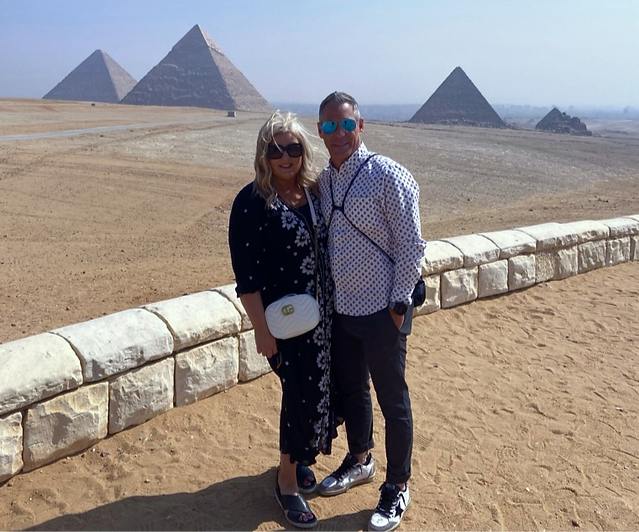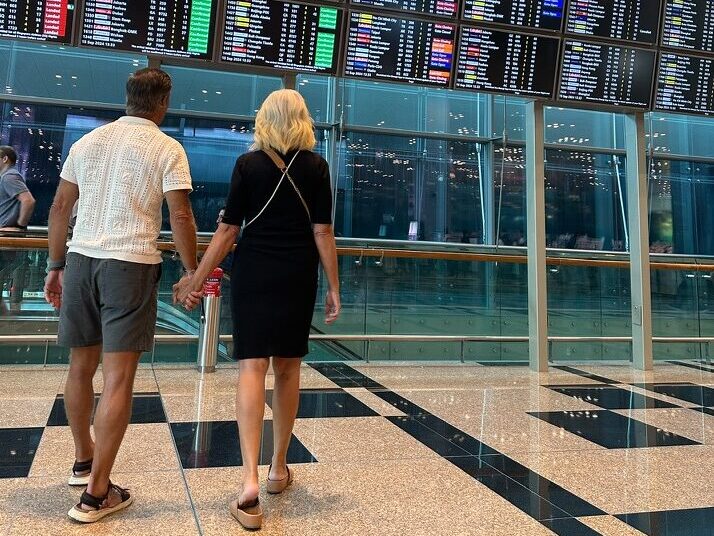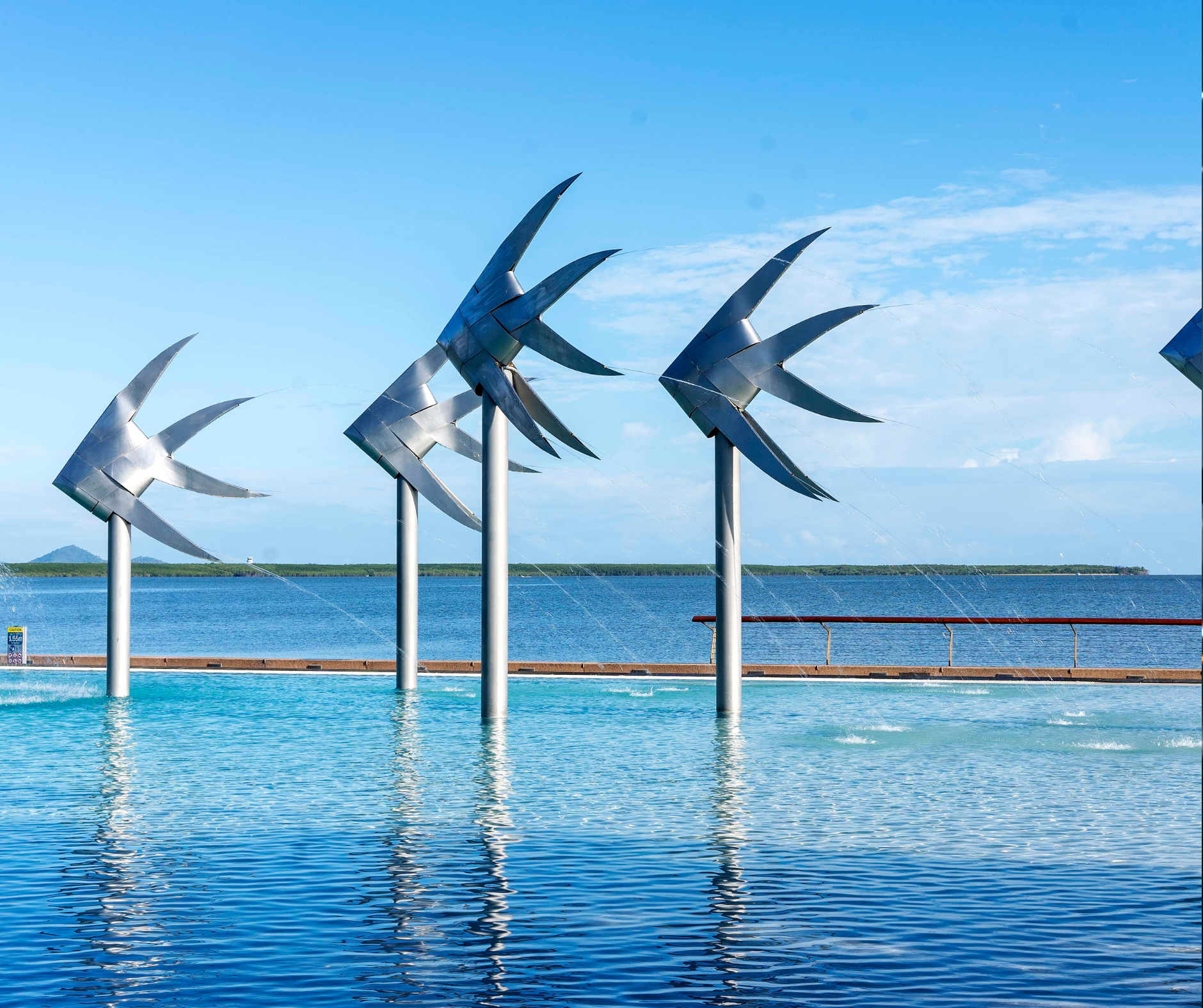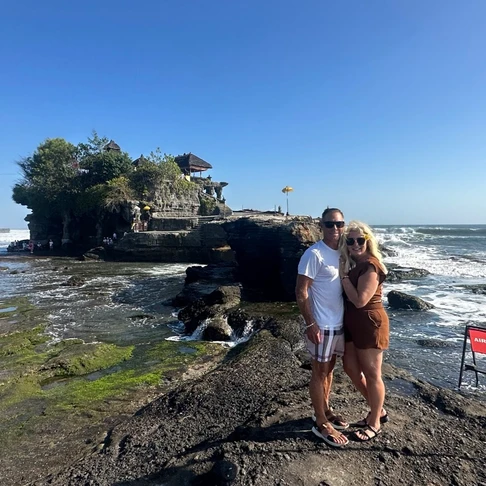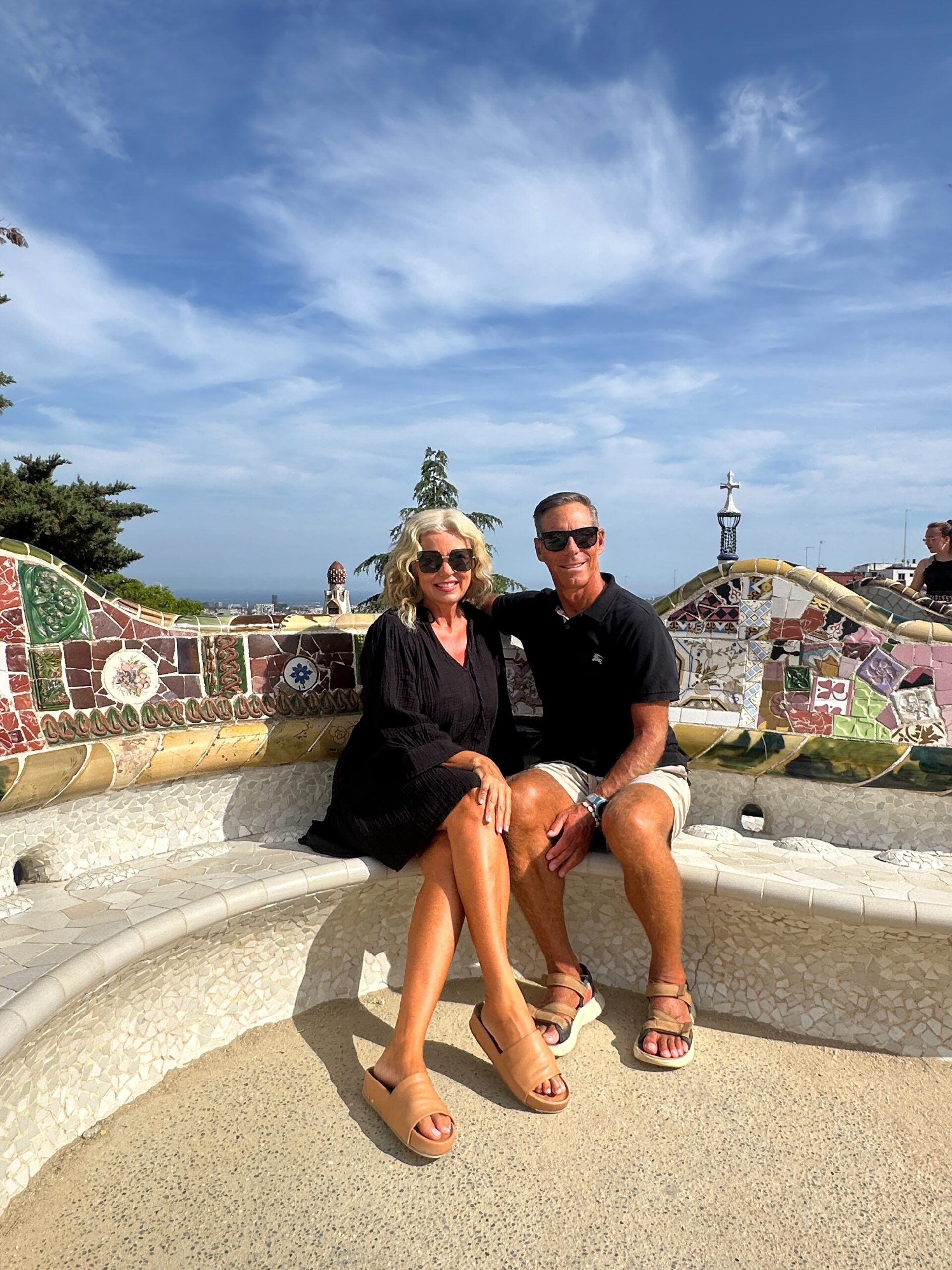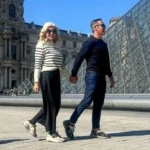Read all about how we spent the best 10 days in Egypt
Egypt had always been a dream destination for me and Shelly. We grew up with Indiana Jones movies and remember learning about ancient Egypt in elementary school. Who isn’t fascinated by thousands of years of history, mysterious pyramids, the Nile River, stories of the Pharaohs and the discoveries of tombs filled with riches? After dreaming about it for years, Shelly and I finally took the plunge and planned an incredible 10 days in Egypt that turned out to be everything we imagined and more. We packed in as much as we could, from exploring the famous sites to cruising down the Nile. Here’s everything you need to know to plan your own epic Egypt adventure.
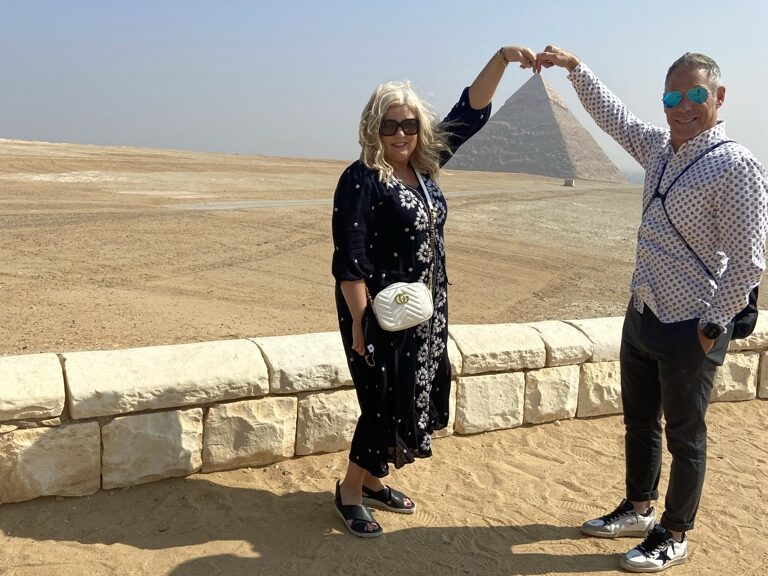
Using a Tour Company for our 10 Days in Egypt vs Booking Everything Ourselves:
When planning our trip to Egypt, we faced the classic travel dilemma: should we book everything on our own or go with a tour company? We love the freedom of planning our own adventures, but when it came to Egypt, we ultimately decided to use a tour company—and we’re so glad we did.
Booking everything on your own certainly has its perks. You can tailor your itinerary to fit your exact preferences, move at your own pace, and often save money by finding deals on flights, accommodations, and activities. And you know how we love finding a good deal! Plus, there’s something thrilling about crafting your own adventure, discovering hidden gems along the way, and feeling that sense of accomplishment when it all comes together seamlessly.
However, we discovered that Egypt is a destination where a little extra guidance can go a long way. The country is rich with history, culture, and iconic sites, but navigating the logistics can be tricky. From deciphering transportation options to understanding local customs and language, planning an Egyptian trip can be overwhelming, especially if it’s your first time. That’s why we decided to use a tour company, and it made our experience so much smoother and more enjoyable.
Our tour company took care of all the details, from securing tickets to the Pyramids of Giza to arranging transportation between cities. We ended up booking a private 10 day tour in Egypt and had an amazing knowledgeable guide who brought the history of ancient Egypt to life in a way we never could have on our own. He knew the best times to visit each site to avoid the crowds, which made our experience even more special. While we usually love the adventure of independent travel, in Egypt, having everything expertly organized allowed us to relax and fully immerse ourselves in the incredible journey without worrying about the logistics.
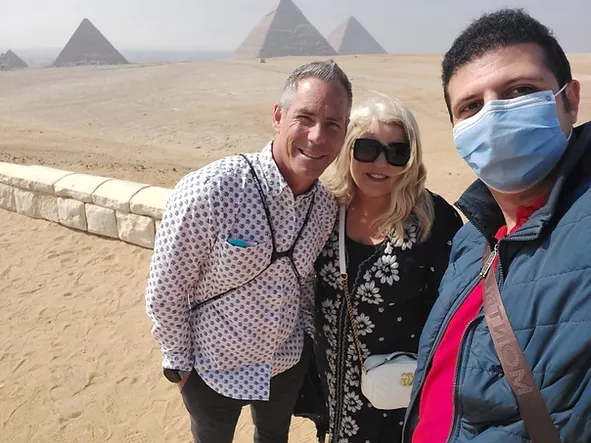
When to Visit Egypt:
The best times to visit Egypt are during the cooler months from October to April, when temperatures are more comfortable for exploring the country’s iconic sites. We visited in early March and it was perfect! During this period, the weather is typically mild, making it ideal for visiting the Pyramids, cruising the Nile, or exploring ancient temples without the intense heat of summer. December and January are peak tourist months, so while the weather is great, it’s also the busiest time. If you prefer fewer crowds, consider visiting in October, November, or early spring in March and April. These shoulder seasons offer a balance of pleasant weather and a more relaxed atmosphere.
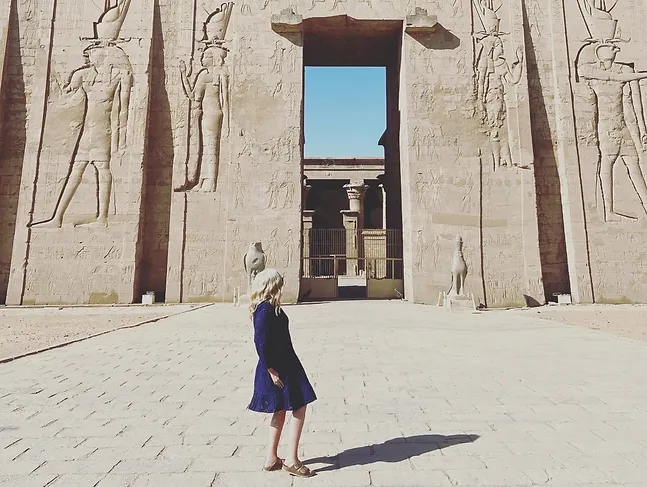
Our Exact Itinerary for 10 Days in Egypt
Day 1: Arrival in Cairo
We arrived in Cairo, excited and ready to explore. The airport was one of the craziest ones we have ever seen. Luckily our guide was able to meet us airside and navigated obtaining our visas and getting us through customs seamlessly. After checking into The Marriott Mena House (one of the coolest hotels we’ve ever stayed at-read our review HERE!), we headed straight to the Egyptian Museum. It’s packed with ancient artifacts, including the treasures from Tutankhamun’s tomb. Seeing the golden mask of King Tut up close was incredible. The museum gave us a great introduction to Egypt’s rich history and set the tone for the rest of our trip.
After our visit to the museum, we spent the afternoon fighting jet lag by relaxing by the pool. In the evening, we enjoyed a welcome dinner at the hotel’s restaurant, where we sampled delicious Egyptian cuisine and got our first glimpse of the pyramids illuminated against the night sky.
Day 2 of Our 10 Days in Egypt: The Pyramids of Giza and the Sphinx
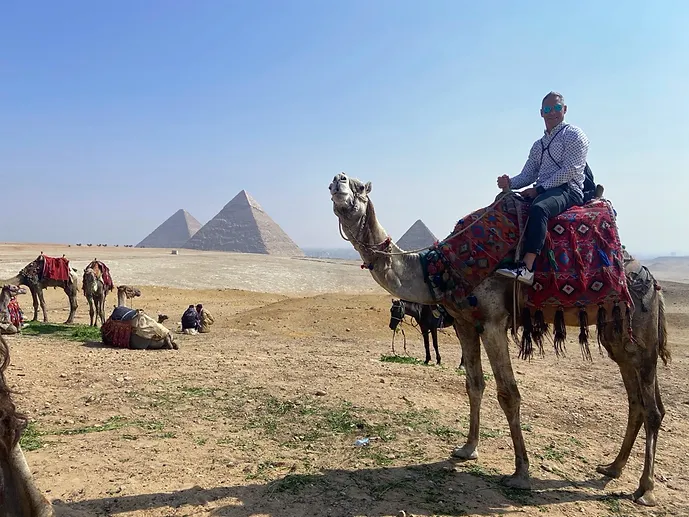
Our second day was all about the iconic Pyramids of Giza. Seeing the Great Pyramid in person was surreal—it’s massive! Visiting the Pyramids of Giza was a dream come true, and standing before these ancient wonders was truly awe-inspiring. The sheer size and majesty of the pyramids took our breath away, and the sense of history that surrounds them is palpable. We decided to go inside the Great Pyramid, which added an extra layer of excitement to the experience. As we climbed stairs down through the narrow passageways, the air grew cooler and the walls seemed to close in around us. Reaching the King’s Chamber was surreal—it’s incredible to think about how this structure was built thousands of years ago without modern technology. The sense of connection to the past was overwhelming, and it was a moment we’ll never forget.
After exploring the pyramids, we made our way to the nearby Sphinx, whose enigmatic expression has captivated travelers for centuries. After a camel ride around the pyramids, we spent the afternoon learning about the history and significance of these monuments from our knowledgeable guide before returning to our hotel for a relaxing evening.
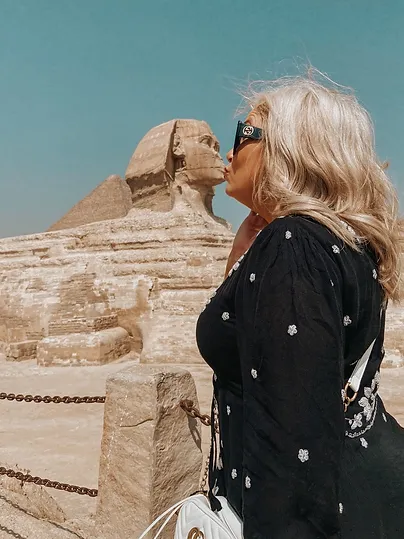
Day 3 of Our 10 Days in Egypt: Saqqara and Memphis
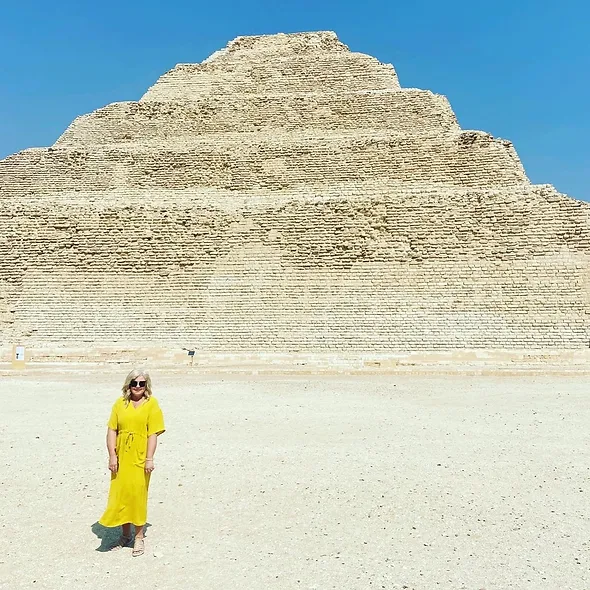
On the third day, we explored Saqqara, where the Step Pyramid of Djoser stands. It’s the oldest pyramid in Egypt and a fascinating place to visit. Walking around the ancient tombs felt like stepping back in time. The carvings and hieroglyphs on the walls told stories that were thousands of years old. We were surprised at how amazing this much less popular pyramid site is and highly recommend you make time for it.
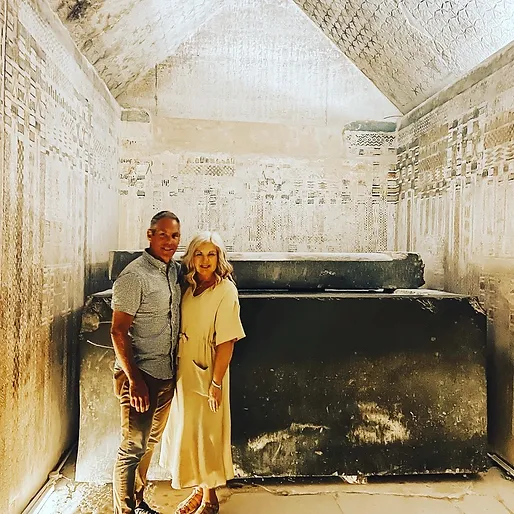
Next, we visited Memphis, the ancient capital of Egypt. The highlight here was the massive statue of Ramses II. The open-air museum gave us a glimpse into what this once-great city must have been like. It was a peaceful spot, perfect for soaking in the history.
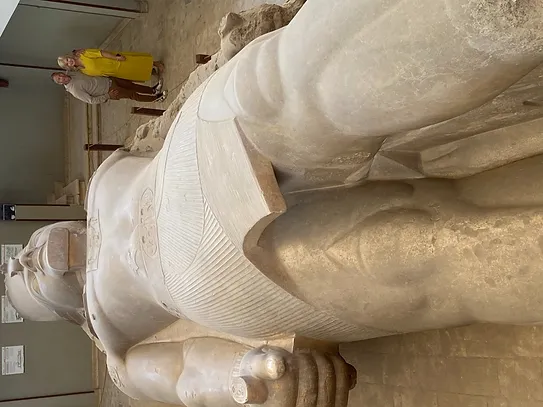
Day 4 of Our 10 Days in Egypt: Fly to Aswan and Board the Nile River Cruise
We left Cairo behind and took a short flight to Aswan, where our luxury Nile River cruise awaited us. Our suite was spacious and beautifully appointed, with floor-to-ceiling windows offering breathtaking views of the Nile. After settling in, we enjoyed lunch on the deck as we sailed towards the Philae Temple. This beautiful temple dedicated to the goddess Isis is located on an island and was relocated to its current site after the construction of the Aswan High Dam.
In the afternoon, we visited the Aswan High Dam, a modern marvel compared to all the ancient sites we had seen. The dam plays a crucial role in Egypt’s water management. We also checked out the Unfinished Obelisk, which gave us a glimpse into how these massive monuments were carved out of solid rock.
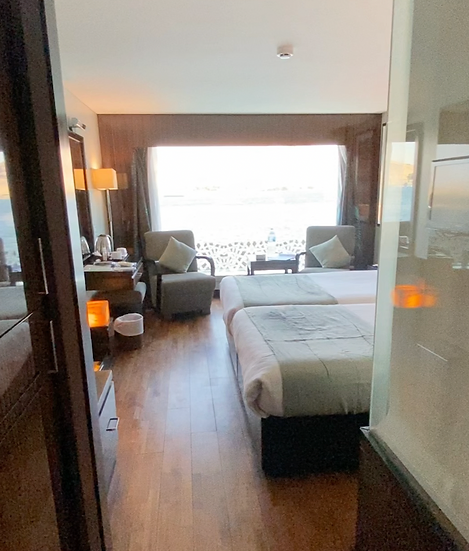
Day 5 of Our 10 Days in Egypt: Kom Ombo and Edfu Temples
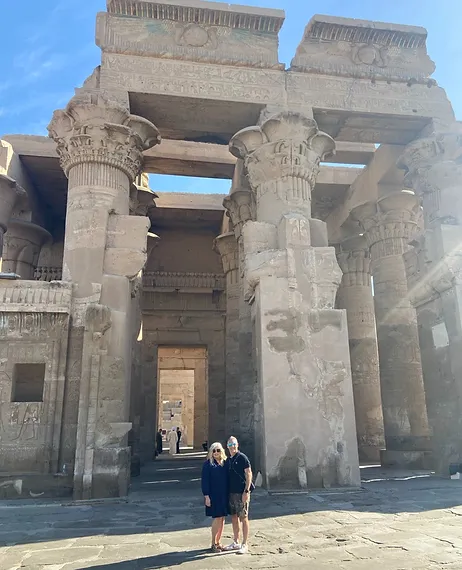
The following day, we continued our journey along the Nile, stopping at two of Egypt’s most unique temples. Our first stop was Kom Ombo, a temple dedicated to both Sobek, the crocodile god, and Horus, the falcon god. The dual dedication is reflected in the temple’s symmetrical design, with duplicate halls and sanctuaries.
After exploring Kom Ombo, we sailed to Edfu, where we visited the Temple of Horus, one of the best-preserved temples in Egypt. The massive structure and intricate carvings were incredible, and our guide shared fascinating insights into the temple’s history and significance. We also visited a small museum that housed crocodile mummies, which were worshipped in ancient times. It was a bit creepy but very interesting.
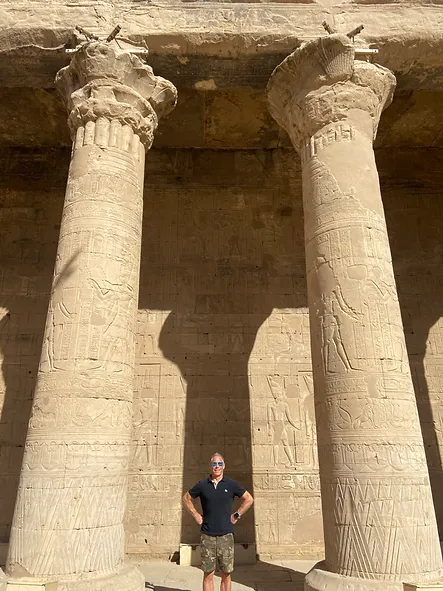
Afterward, we enjoyed another peaceful evening on the Nile as the sun set behind us. In the evening, we returned to the ship for a lively galabeya party, where we dressed in traditional Egyptian attire and enjoyed music and dancing under the stars.
Day 6 of Our 10 Days in Egypt: The Valley of the Kings and Hatshepsut’s Temple
The next day found us in the Valley of the Kings, where we visited several tombs, including the famous tomb of Tutankhamun. The vibrant colors and intricate designs inside the tombs were incredible. It was amazing to see how well-preserved everything was, even after thousands of years.
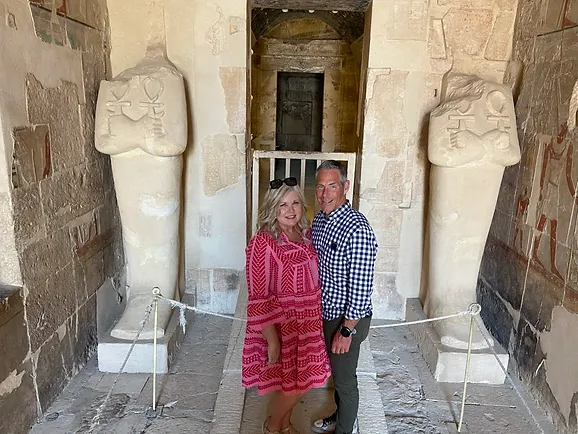
In the afternoon, we explored the Temple of Hatshepsut, which was built into the side of a mountain. The temple was stunning, with its terraces and statues. Learning about Hatshepsut, Egypt’s first female pharaoh, added another layer to our understanding of ancient Egypt.
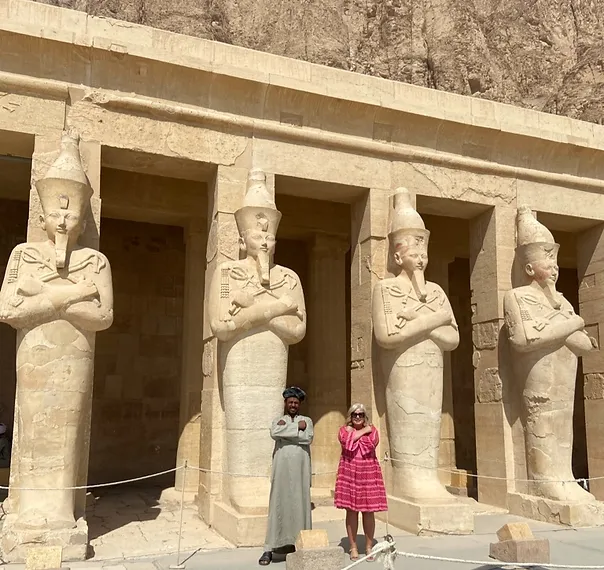
Day 7 of Our 10 Days in Egypt: Nile River Cruise – Luxor
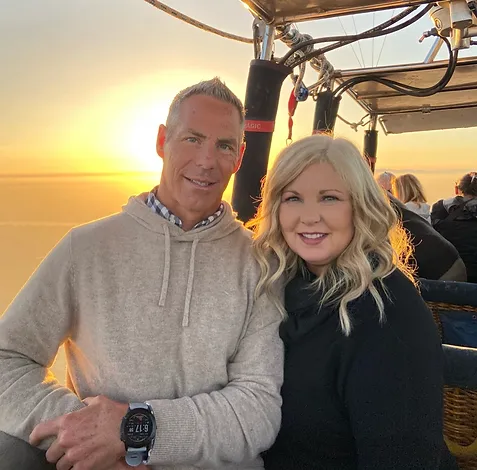
Day seven started with an early wake up call for a hot air balloon ride. The quiet of the morning set the tone as we made our way to the launch site. Once airborne, we could see the Nile and the ancient temples of Luxor as the sun began to rise over the Valley of King and the Valley of the Queens. It was an unforgettable experience, giving us a unique perspective of Egypt from above.
After a quick stop for breakfast, we headed to the Karnak Temple Complex. The towering columns and intricately carved statues made us feel tiny in comparison. Exploring deeper into the temple, we discovered a world of ancient wonders and mysteries. Each hall was a treasure trove of history depicted in detailed carvings, from mythological tales to historical events, showcasing the artisans’ incredible craftsmanship. Lost in time, we wandered through the maze-like corridors, uncovering new marvels and imagining what life would have been like in ancient Egypt.
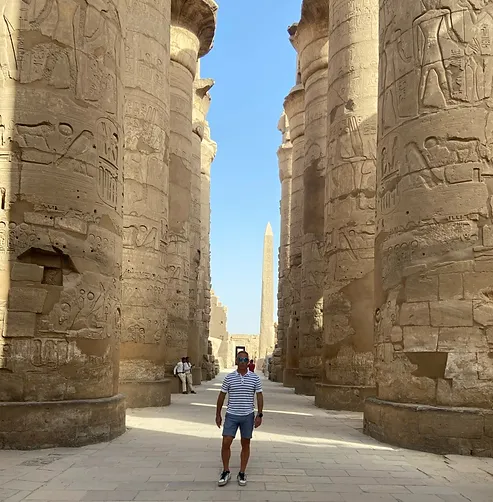
Sadly our Nile River cruise came to and end and we took a short flight back to Cairo in the evening. For our last few days in Cairo, we decided to treat ourselves and stay at the luxurious St Regis Cairo. You can read our full review of this incredible hotel here.
Day 8 of Our 10 Days in Egypt: Cairo Citadel and the Mosque of Ibn Tulun
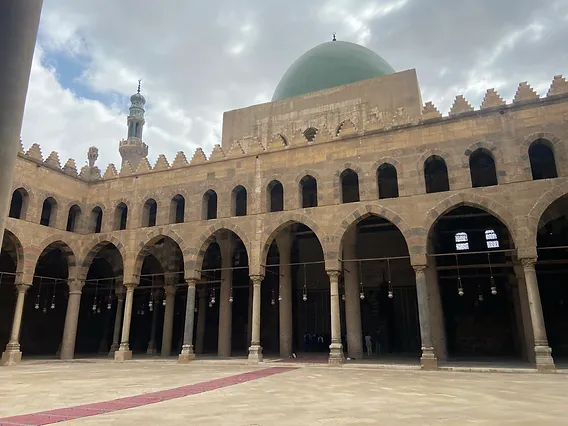
No rest for the weary. We hit the ground running to take advantage of our last few days in Egypt. First up in the morning was the Cairo Citadel, a historic fortress perched on a hill overlooking the city, offers a commanding view of Cairo’s sprawling urban landscape. Built by Salah al-Din in the 12th century, the Citadel has stood as a symbol of Egypt’s military and political power for centuries. Exploring its grounds, we marveled at the imposing walls, grand mosques like the stunning Mosque of Muhammad Ali, and the sense of history that permeates every corner. The Citadel not only provided insight into Cairo’s rich past but also offered breathtaking views of the city, making it a must-visit on any trip to Egypt’s capital.
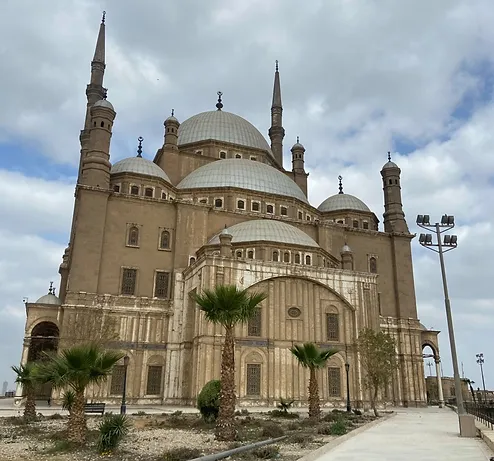
Our next stop was the Mosque of Ibn Tulun. As one of the oldest mosques in the city, it stands out with its vast open courtyard and striking spiral minaret. The mosque’s simple yet majestic design creates a sense of peace and space, allowing us to appreciate the intricate geometric patterns and the history embedded in its walls. Walking through its quiet corridors, we were transported to a different era, reflecting on the centuries of worship and community that have taken place within its walls.
We decided to take the afternoon off from sightseeing and returned to our hotel for a little bit of relaxation. After enjoying a delicious lunch, we spent the afternoon at the pool.
Our tour guide talked us into booking tickets to the light show at the pyramids. We expected this to be kind of cheesy, but we ended up really enjoying it. As the sun set and darkness fell, the pyramids were illuminated by vibrant lights, while a narrated story unfolded, recounting the history and mysteries of these iconic monuments. It was a memorable evening that added a dynamic layer to our exploration of Egypt’s ancient past.
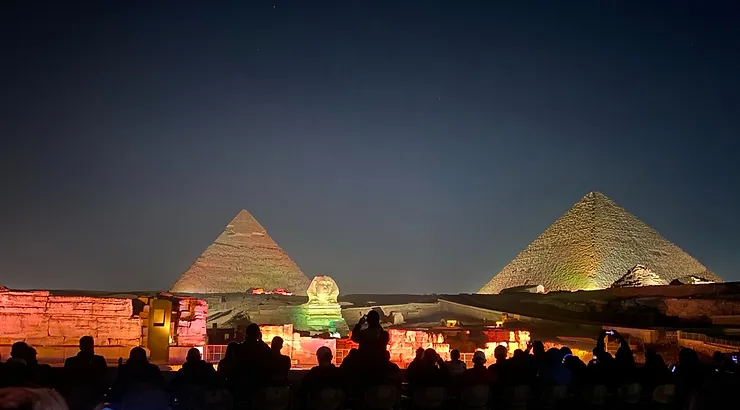
Day 9 of Our 10 Days in Egypt: Coptic Cairo and Khan El Khalili Bazaar
On our final day in Cairo, we knew we wanted to visit the Hanging Church. Perched above a gatehouse of the Babylon Fortress, the church is one of the oldest in the city and a key site in Coptic Christianity. The Hanging Church holds a special place in Christian tradition as it is believed to be one of the sites where Mary and Joseph sought refuge with the infant Jesus during their flight into Egypt. This connection adds a profound spiritual significance to the church, making it a key pilgrimage site for those tracing the Holy Family’s journey. As we walked through its ancient halls, we were reminded of its deep roots in the Christian faith and the layers of history that have shaped this sacred space. The church’s role in this biblical story adds to its rich heritage, making it more than just a historical site—it’s a place of deep reverence and connection to the past.
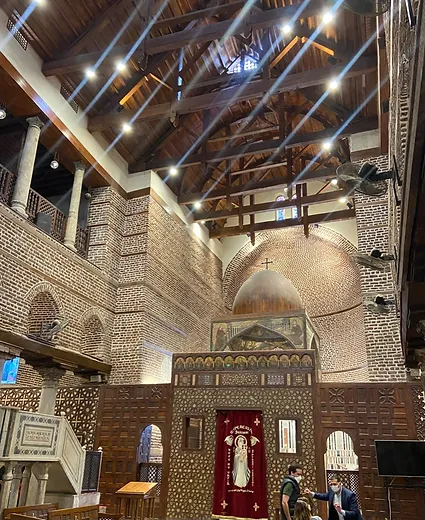
Afterward, we wandered through nearby attractions, including the Ben Ezra Synagogue, known as the oldest Jewish temple in Cairo, and the Coptic Museum, which offered deeper insights into Egypt’s Christian heritage. These sites, all within walking distance, made for a day steeped in culture and history.
We had lunch at the nearby Khan El Khalili Bazaar. The market was a maze of narrow streets filled with shops selling everything from spices to souvenirs. It was a lively and colorful place, and we enjoyed getting lost in the hustle and bustle.
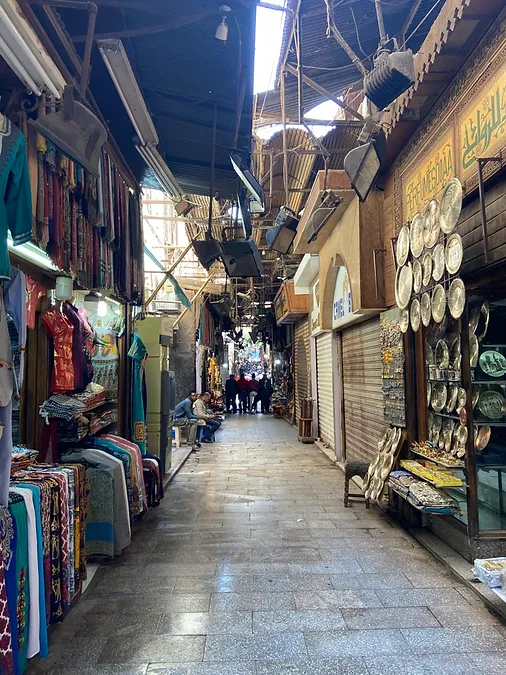
We spent our last afternoon haggling for treasures and sipping mint tea at a local café. It was a great way to experience the vibrant culture of Cairo before heading back home, and we left with our bags full of memories (and a few souvenirs).
Day 10: Depart for home
Our 10-day trip to Egypt was an incredible adventure. We saw some of the most famous sites in the world, cruised down the Nile, and immersed ourselves in the rich history and culture of this amazing country. Every day was filled with new discoveries, and we left with a deep appreciation for the wonders of Egypt. If you’re thinking about visiting, we can’t recommend it enough—it’s a trip of a lifetime!
Travel isn’t just about places—it’s about people, experiences, and making memories. Hi! We are Shayne and Shelly Peterson. As empty nesters, we’ve found new ways to connect with the world (and each other) through travel. Follow our journey at JetSetPetersons.com and let’s explore together!
At Jet Set Petersons, we occasionally collaborate with brands, companies, and tourism boards to bring you content that aligns with our love for travel. Some of the posts on this website may include sponsored content, affiliate links, or gifted experiences.
We only partner with brands that we genuinely love and believe will bring value to our readers. While we may receive compensation in the form of payment, free stays, or complimentary products, all opinions expressed are our own. Honesty and transparency are at the core of what we do, and we would never recommend anything we wouldn’t personally use or enjoy.

